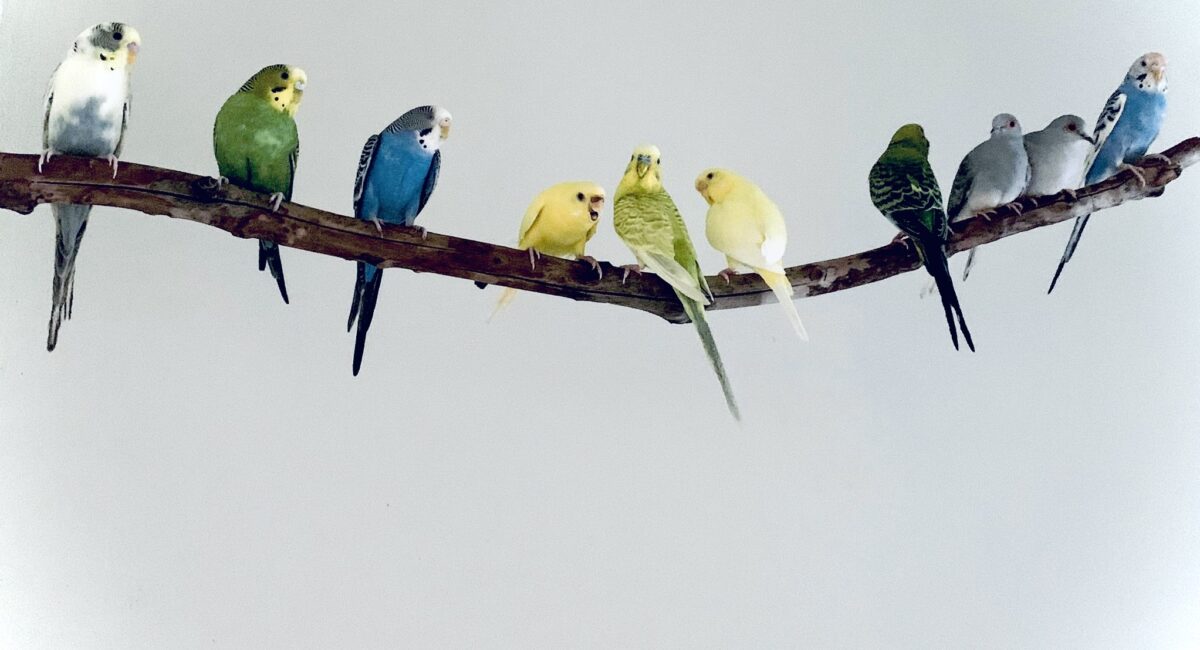What are the Best Bird Species for Beginners
I know how challenging it would be to choose a pet bird for the first time. To be honest with you it is a rewarding and fulfilling experience. Birds bring joy, companionship, and a touch of nature into our homes. In my opinion, as a first-time bird owner, you should go for small and less care-required species. With that being said let’s delve into what are the best bird species for beginners.
Budgerigar (Budgie)
Budgerigars, also commonly known as parakeets, are one of the most popular choices for first-time bird owners. They were my first pet birds. These cheerful and colorful birds are native to Australia. They are about 7 to 10 inches long and live around 5 to 7 years. These little birds are very friendly, playful, and easy to train. They also have the ability to mimic sounds and learn cool tricks (especially English Budgie).
If you are looking for relatively low-maintenance and affordable birds, then budgies can be a great choice. Their diet only depends on seeds, vegetables, and fresh food. I’d recommend adding various types of toys because of their playful nature. Their playful nature makes them a delightful companion for beginners.
Cockatiel
My mom’s best choice is cockatiels which is native to Australia. This medium-sized bird can be an excellent choice for novice bird keepers. They have achieved their popularity for their wonderful crest and sweet temperament. They are about 12 – 15 inches long and live around 15 – 20 years. They can learn some mimic sounds and have a wonderful whistle tune.
Just like budgies, they are relatively low-maintenance breeds that require a balanced diet of pellets, seeds, and fresh produce. A spacious cage is recommended with a horizontal bar for climbing. They also require regular human interaction and toys to keep them happy and healthy.
To learn more about cockatiels read this article:
A Complete Profile Of Cockatiel And Care Overview
Canary
A small songbird, popular for its melodic tune originating from the Canary Islands. If you are a morning person and enjoy listing birdsong then Canaries are the ideal birds for you. Their beautiful songs add a soothing ambiance to any home. Often males are more vocal than females. They are very independent and love observing their surroundings. Another great thing about Canaries is that they do not require direct interaction like other birds. They require a diet of high-quality seeds, fresh fruits, and vegetables. They can be an awesome choice for bird enthusiasts who prefer less hands-on interactions.
Zebra Finch
Zebra Finches are small (3 – 4 inches), and active birds. They come in various colors and patterns. Their lifespan is about 5 – 7 years. They are very social birds but they do not bond with humans as closely as other birds. They love to live in pairs or small groups. But their cheerful chirping and active behavior make them enjoyable to watch. They are generally low-maintenance birds but you have to keep them in a clean and safe environment. They thrive on a diet of seeds, and grit. They need a larger cage with ample space for flying. This can be a perfect choice for a family with kids, who prefer observing birds over direct interaction.
Read another helpful article:
A Parent’s Guide to Choosing the Best Birds for Kids
Lovebird
If you want to spend lots of time training your birds, I would say lovebirds are the perfect choice. These small parrots are known for their vibrant colors and strong bonds between pairs or you as an owner. Native to Africa, lovebirds are affectionate, playful, and sometimes feisty. They are 5 – 7 inches long and live around 10 – 15 years. These small parrots need a varied diet of seeds, pellets, fresh fruits, and vegetables. You may have to provide some supplements for them. They also require out-of-cage time, I recommend at least 2 hours per day. You need to provide plenty of toys, daily interaction, and mental stimulation to keep them from becoming bored and destructive. Love birds are the perfect choice for the beginner who loves to engage with their pets.
Quaker Parrot
Quaker parrots are small to medium-sized parrots, also known as monk parakeets. They are very intelligent, sociable, and can be quite vocal sometimes. They are well known for their exceptional talking ability and outgoing personality. Quaker parrots are approximately 11 – 12 inches and live around 20 – 30 years. Their natural range includes parts of Argentina, Brazil, Paraguay, and Uruguay. These parrots need a diet of pellets, seeds, fruits, and vegetables. They need a sturdy cage with toys and perches for regular stimulation. Their playful nature can be an excellent choice for beginners.
Diamond Dove
They are my personal recommendation if you want to live a hassle-free life with a pet bird. I had two wonderful Diamond Doves that had passed away in April 2024. They are quite nice to have from my experience as they are very gentle and associated with peace and tranquility. Their soft cooing is soothing and adds a peaceful atmosphere to the home. They are docile, affectionate, and enjoy human companionship. They are very low-maintenance pet birds that require only seeds, grains, and grits. Another good thing about them is they don’t need regular human interaction, but they enjoy living in pairs. So, if you are planning to have them make sure you give them a friend.
Pionus Parrot
Pionus parrots are also less demanding than other parrot species. They are known for their quiet demeanor and sweet disposition. These medium-sized parrots are about 10 – 12 inches and live around 25 – 40 years. They are native to Central and South America, where they inhabit tropical and subtropical forests. If you are looking for a parrot with a quiet nature they can be a great option for you. But, they do need a spacious cage with toys and perches, and a diet of pellets, seeds, fruits, and vegetables. Daily out-of-cage can be helpful for their well-being. Their calm and steady nature makes them an ideal pet for beginners.
Common Challenges for Beginners
In the beginning, I faced lots of challenges, and owning a bird comes with its challenges. Remember all birds are not the same and they have unique behaviors that can be misinterpreted. Here are some challenges you might face in the future:
- You may struggle with recognizing normal behavior vs signs of distress or illness.
- You may not know which foods are safe and appropriate for your birds. Every bird has specific dietary needs.
- Training and socialization require patience and consistency; as a beginner, you may find it challenging to establish an effective training routine.
- Birds often hide symptoms of illness, as a beginner it will be difficult for you to identify the symptoms of illness so try finding an avian veterinarian for advice if you get too worried.
- Some birds are very noisy and messy, which can be overwhelming for new owners who are not prepared for the level of maintenance required.
- Some new owners underestimate the amount of attention and care their birds need.
- Bonding takes time, and some beginners might feel discouraged if their bird is initially shy or fearful.
Quick Overview
| Bird Species | Size | Lifespan | Personality Traits |
| Budgerigar (Budgie) | 7-10 inch | 5-7 years | Friendly, playful, and easy to train. |
| Cockatiel | 12-14 inches | 15-20 years | Affectionate, sociable, whistles and mimics. |
| Canary | 4-5 inches | 10-15 years | Low maintenance, beautiful singing. |
| Zebra Finch | 3-4 inches | 5-7 years | Sociable, easy to care for, thrives in pairs. |
| Lovebird | 5-7 inches | 10-15 years | Energetic, social, playful. |
| Quaker parrot | 11 – 12 inches | 20 – 30 years | Playful, independent, territorial. |
| Diamond Doves | 7.5 to 9 inches | 10 to 14 years | Gentle, calm, easygoing, quiet. |
| Pionus Parrot | 10 – 12 inches | 25 – 40 years | Affectionate, loyal, gentle, independent. |


